#afroargentines
Text
I have something beautiful to share with you all: give this a listen. What do you think it is?
There's many different versions of this song, just type "Misibamba" on spotify or youtube, and enjoy. It's specifically an AfroArgentinean song, with most of the versions of this song recorded in Buenos Aires. According to african scholars, the song was originally in kikongo, possibly from the Benguela Nation, and it's traditionally sung to call on God (Nzambi Npungu). Some of the words have gone through slight (and not so slight) pronunciation or spelling changes but it's still recognizable for scholars in Angola!
What scholars say about it being originally used to call on God fits our own oral tradition and custom too, it's a religious song. Our elders sing it in times of need, when you need that extra ancestral and divine protection or guidance, and Elders say it was originally sung by our Ancestors in the slave ships as they were crossing the atlantic !!!
And it's not even the only song that remains! there's many other songs in african languages and derived dialects, remembered and sung by afroargentine Elders across the country. After so many years of denial and historical whitewashing, I'm so, so deeply grateful for all the afroargentine and african scholars, and afroargentine collectives and associations, working to preserve our music and dialects, and finally bring them back to the light, to remember and honor our Ancestors.
#Afroargentina#Afroargentinean#Afrolatinos#Afrolatines#Afroargentine#Afroargentines#history#afroargentine history#kikongo#angola#benguela#Nzambi Mpungu#ATRs#ADRs#African Traditional Religions#african diaspora#black argentina#black argentines
19 notes
·
View notes
Photo
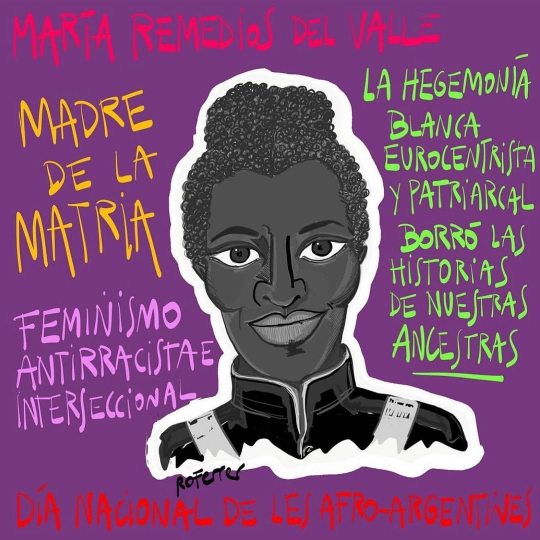
via @decolonize__ #afroargentine #mariaremediosdelvalle #dianacionaldelesafroargentines #8denoviembre • artists @roferrerilustradora @chirimbote @eliohcomics @torrezmarianela (at Argentina) https://www.instagram.com/p/Ckt1kREPS59/?igshid=NGJjMDIxMWI=
0 notes
Photo

Posted @withrepost • @decolonize__ #afroargentine #mariaremediosdelvalle #dianacionaldelesafroargentines #8denoviembre • artists @roferrerilustradora @chirimbote @eliohcomics @torrezmarianela (at Argentina) https://www.instagram.com/p/Cktzfo8vKre/?igshid=NGJjMDIxMWI=
0 notes
Note
hablando del tema de la negación de les afroargentines y los pueblos originarios yo creo que si a un yanqui le explicás lo que fue Rosas le estalla la cabeza, especialmente por la reivindicación de su figura que se da desde los grupos populares que obviamente incluyen afroargentines y originaries aún con la contradicción de haber liderado una campaña del desierto
Rosas es un tema complicadísimo de explicar. Una de sus principales bases populares eran los afroargentinos libertos, él también prohibió el comercio de esclavos; esto está bien registrado en todo tipo de fuentes de la época:

La oposición "liberal" y "moderna" a Rosas en cambio, los odiaba, no hace falta más que leer la forma en que son demonizados en El Matadero con un lenguaje racista que da horror, para los "liberales" argentinos, los "negros" eran algo que tenía que ser removido para el "progreso". Desde esa perspectiva, no es mucho misterio su apoyo a Rosas. Al mismo tiempo, Rosas también era un hipócrita, porque tenía esclavos (que luego liberó, pero sus memorias apuntan a razones económicas más que amor a la libertad), y nunca abolió la esclavitud formalmente (aunque sí el comercio, junto con la libertad de vientres, que funcionalmente fue lo mismo), sus razones para apoyarlos eran claramente políticas. Pero aún así significaron un momento histórico para los afroargentinos que otros han estudiado mejor que yo.
El mismo Rosas que hizo también las primeras campañas del desierto también luego hizo la paz con Calfucurá, el gran cacique mapuche "Emperador de las Pampas", otorgandolé el rango del coronel en el ejército argentino y afianzando una larga alianza (De vuelta, esto está mejor explicado por otras fuentes). Tal fue así que batallones mapuches pelearon por Rosas en la batalla de Caseros, lo cual no volvió a pasar con los gobiernos sucesivos. La caída de Rosas implicó la ruptura de los pactos de Calfucurá con el gobierno argentino y eventualmente llevó a una relación más hostil que concluyó en la Conquista del Desierto ideada por Sarmiento y Mitre y llevada a su conclusión por Roca.
La misma Conquista del Desierto en donde también participaron criollos, afroargentinos, e "indios amigos" junto a sus mujeres (y no solamente como apoyo, sino como guerreras: esto lo vimos en una charla histórica hace poco), con la promesa de que las tierras capturadas iban a ser para ellos también. Porque no, no fueron todos soldados blancos recién llegados de Europa, en realidad casi ninguno con excepción de los comandantes (que también eran descendientes de la aristocracia colonial). En esas campañas, como siempre, fueron a la guerra los mismos gauchos que lucharon por la independencia y en las guerras civiles.
Todos sabemos lo que pasó después; el desplazamiento y exterminio de los pueblos originarios, "amigos" o no, la repartición de la conquista entre terratenientes y comandantes, y la marginalización de los afrodesciendentes y los criollos en la sociedad.
La historia es complicada.
35 notes
·
View notes
Text
they come and preach to us about 'argentina is white' 'argentina is racist' and don't look at their own history & present. we know better than anyone about how strong racism is here!! those affected by it live through it every day, you can easily see it in your day to day life and we learn about most of the genocides at school. we have the biggest jewish community in Latin America, a big muslim community, many people of different native tribes, afroargentines, etc. all of this data is easy to find with a quick research. you're not fucking helping by reproducing white supremacists discourse. who do you think benefits from the 'white argentina' idea?
#there's not a single country that doesn't systematically oppress a big group of people#girl use your fucking brain a bit.#do you go to brazilians and reproduce what bolsonaro says at them?#do you go to usamericans and tell them they're a white country?#sick and tired of seeing the same discourse every time my country is brought up#we are so much more than the racists that live here#aside from all the poc that already lived here before the big immigration waves more and more people from places all over the world came!!#idk if im putting this into the right words and i cannot talk about experiencing racism firsthand since im white but i needed to get it out#my father is Not White almost none of my coworkers would be considered white by outsiders‚ you walk 1km from the richer parts of -#cities and you can See how many people are anything other than white.#nero habla
52 notes
·
View notes
Text
sorry i can't get over the baffled anon acting like other latines can't be racist against argentinians. you mean to tell me the rich white brazilians who come to argentina as tourists taking advantage of our economic crisis to vacation like royalty paying us cents, but turning their nose when kids from la villa ask them for money or try to sell them stuff in the street isn't racist? or when bolivians and peruvians who have the economic advantage of owning shops call the cops on afroargentines and senegali people who sell as manteros in the streets aren't racist? or like rich tourists from all over latinamerica go to salta and jujuy and disrespect indigenous people, be rude to servers and demand accommodations in a place that already has a very ancestral cultural set of rules, that's not racist? huh.
49 notes
·
View notes
Note
and yet as a black woman you still spread whitesupremasy by negating the existence of afroargentines and indigenous people in my country, choosing to spread the worst racist awful things the rich white people from here say and apply it to the rest of the population as if most of as though the same thing, how come when your government is racist and awful you suffer but when our government is racist and awful It's because all of us are and we deserve it?
The thing, if you weren't illiterate, you would realize that I was very obviously rehashing racists talking point (not mine) to suck it up to them. Like please, the use of emoji made it pretty obvious it was sarcasm....
Like, it's fascinating (and by fascinating I mean scary) how you read that post and felt personally attacked, when what I'm talking about didn't apply to you (but racist Argentinians).
And don't get it twisted, the only people who's been spreading the worst racist awful things are Argentinians themselves lol
The difference between you and me is that when people shit on France and its infamous racism, and say how "french people are racists" -which is a very gEneRalizIng statement- I do not jump on their post to whine and cry about how there are actually black and muslim french who are not racist and how they are actually oppreessed by racistd White french, yadaa yadaaa. I never made content complaining about my government racism anyway, so I'm pretty consistent.
I'm smart enough to grasp that is NOT about me (because I'm not racist DUH) and that France doesn't deserve to white knight it like that. So please, stop thinking brining up France racism like it was a own : I know, and I don't care. Because that's true. NEXT.
Maybe you should take a few pages of my book lol
2 notes
·
View notes
Text
Sobre el tema afroargentines:
En el canal de YouTube de la Televisión Pública se puede ver esta serie de 4 capítulos sobre afrodescendientes en Santa Fe. Cada capítulo gira en torno a distintos ejes: esclavización, invisibilización, expresión y movilización. Está muy bueno como material introductorio para meterse en tema y, personalmente, creo que podría servir para que individual y colectivamente nos hagamos preguntas sobre nuestros orígenes.
Dejo acá el primer capítulo
youtube
8 notes
·
View notes
Note
It's crazy how we went through the whole cup without yanquis finding out about our free college. Or Dyhzy. Or any of the trans rights activists won. I'm sure it's nothing.
I mean, we had Erika Edwards erasing 2 million Afroargentines on a newspaper article because she couldn't be bothered to consult with nor uplift the voices of Afroargentine organizations, activists, academics and scholars, further erasing them... so tbh, nothing surprises me anymore. Gringos, especially yanquis, better keep Argentina's name out of their mouths tbh
5 notes
·
View notes
Text
[ADVERTENCIA A LA SENSIBILIDAD: RACISMO]
Una afroargentina postea una foto con un mensaje de amor propio:

Argentina, un país con buena gente:
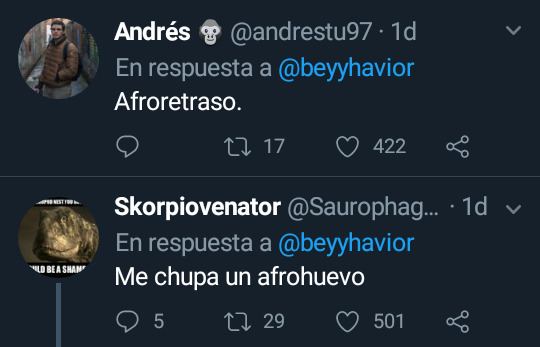
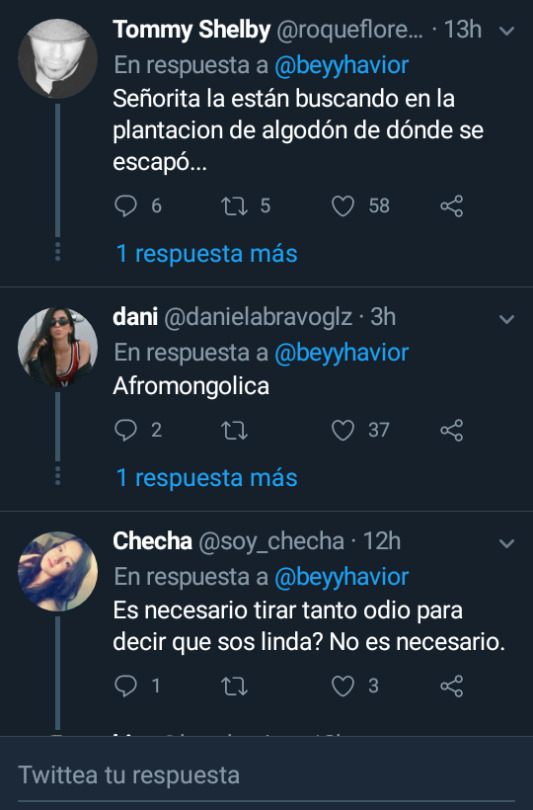






Me tienen harta con que en Argentina no hay racismo o negres, sigan negándose a ver y escuchar la realidad
#argentina#feminismo#patriarcado#latinoamérica#politica#machismo#sexismo#lenguaje inclusivo#latines#racismo#afroargetina#afrolatine#afroargentine#twracismo
10 notes
·
View notes
Note
okay but im brazilian and really want to learn more about argentine history, do u have any websites/ youtube videos to recommend? I do know spanish so it doesn’t matter what language it is in
hey! of course, it's my pleasure, everyone is welcome to learn. okay, so i gather you want audiovisual stuff; i got documentaries and video essays, and i'm glad you know spanish because the majority of these are in spanish.
hour of the furnaces (subtitles in english) it's a militant film from 1968, regarded as 'paradigm of revolutionary activist cinema' (really selling it to you here lol) and it exposes argentina as a dependent nation in its economy, culture and society. there's three parts, all of them together last about four hours, i haven't made it all the way through tbh but i do highly highly recommend watching the first part 'neocolonialism and violence', it actually breaks my heart how present these problems still are today.
what is peronism (in english) this guy is a white australian who's been living here for a couple of years, and i think this video is the closest anyone (on youtube!) who's not argie has gotten to explaining what peronism, the most popular political identification for the past 75 years, actually is (in video form! there are so many videos on peronism by gringos and they're all awful). he's done his researchhhh, goes back all the way to colonial times to make his points. (i hear the guy's kinda controversial so i only vouch for this one vid and this one on the argentine dictatorship, i don't know him)
so. there are two beautiful gorgeous platforms where you can watch a tonnnnn of argentine documentaries, films and series for free, you only have to register with your email and it's done. go crazy go wild because there's just so much.
the first one is cont.ar, this one mainly hosts documentaries. my faves so far are: "Acá estamos. Historias de nietos que recuperaron su identidad" where children appropiated by the dictatorship, now adults, tell their stories | "Archivo de la memoria trans" telling the stories of the trans women who've donated their photographs and memories to the trans archive | "Argentina también es Afro" afroargentine history!
the other one is cine.ar, hosts mainly films. "Juntas" tells the story of the first lesbian couple who got legally married in argentina | "El puto inolvidable" a film about carlos jauregui, an argentine gay activist | "La memoria de los huesos" documentary on the Argentine Forensic Anthropology Team, that does the hard work of identifying the bodies of people disappeared by the dictatorship in Argentina and in similar circumstances all over the world
these are only a few, hope you find something you enjoy and learn to your heart's content!
129 notes
·
View notes
Text
Let's talk about San Baltasar, the Wise King, Saint of Afroargentines.
I think it's extremely interesting how one of the biggest afrodiasporic cults native to Argentina is that of El Santo Negro (the Black Saint) St. Balthazar, the Wise King. Other syncretic saint cults make mention to african deities or saints with titles such as "The Queen of Rivers" or "The Queen of the Sea", making the deities involved easily identifiable, but this cult in particular is one of the most widespread across the black population of Argentina and yet the most elusive in regards to who may be behind the mask. At least, until you pay attention to the details.
The Church first introduced the cult of Catholic Figures and Saints such as San Baltasar (King Balthazar) or San Benito de Palermo (St. Benedict of Palermo, the Moor) as a way to control the enslaved population politically and culturally. Although their goal was to dissipate african religions and install catholicism among them instead, they underestimated black argentines: after much effort, the church allowed the enslaved faithful to organize socially and politically and perform dances, drumming and singing for the saints of their formed Cofradía (similar to a congregation, but including social and political structures within it, naming a king and queen or a president and other culturally and politically significant roles). Thanks to the passing down of african culture and customs through these organized societies and the syncretism within them, we can proudly say the church failed in their attempts. The african spirits are very much still an integral part of afroargentines' lives. Today, although it has spread across the country and beyond, the center of this cult is in it's origin, the capital city of Corrientes, Argentina, in a neighborhood called Cambá Cuá.
The cult to San Baltasar is clearly african in origin, although with indigenous (guaraní) influences, such as calling the saint Santo Cambá/Kambá (Black in guaraní language), calling his statues Cambára'angá (guaraní for Black Figure), and some dancers dressing up as indigenous figures like el pombero, among other things. Thus, it is an afroindigenous cult, developing amongst mixed descendants of african enslaved peoples and guaraní natives. The cult is also a local expression of the most african of customs: ancestral veneration. The festivities honor not only the Saint himself, but all the black ancestors before us who are present in pictures at the altar, and answer to the call of the drums. The color red, that covers the saint and adorns his followers, is the color of warriors and protection in African Traditional Religions. He's offered food and drink (such as wine and traditionally made sangría), and most importantly dance and drums. He is invoked and honored, along with the ancestors, through drumming and dancing, through La llamada a San Baltasar and Saludos de Tambores a los Santos Cambá (Calling Saint Balthazar and Drum Salutations to the Black Saints).
His festivities, held in Corrientes around Epiphany, from January 1st to the 6th, include dancing afroargentinean rhythms such as diverse forms of candombe and samba. Particularly, he was traditionally honored with a dance called bambula, a form of ring dance where women move in short and slow steps, barely lifting their feet, while men jump in the air, and where one singer sings a phrase that is then repeated or answered by the others present. This kind of dance is native to Congo and Angola, and widely practiced by enslaved people and their descendants in the Southern United States, the Caribbean, Brazil, Argentina and Uruguay. The music used to this day to petition favors, to invoke his spirit into his image and even dispel or call thunderstorms or other natural phenomena, is called charanda and includes drums, guitars and triangles. Just like in other afrodiasporic devotional and resistance dances, these dances involve Kings and Queens of the dance, a hierarchy of drummers including those called Master drummers, and a hierarchy of the drums themselves as Chico, Repique and Piano.
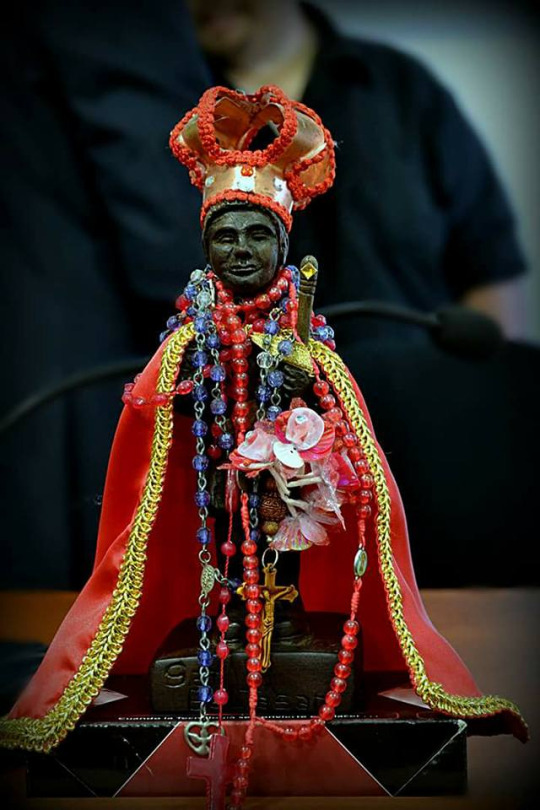
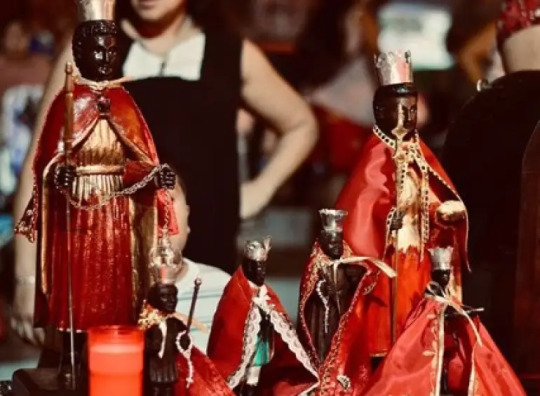
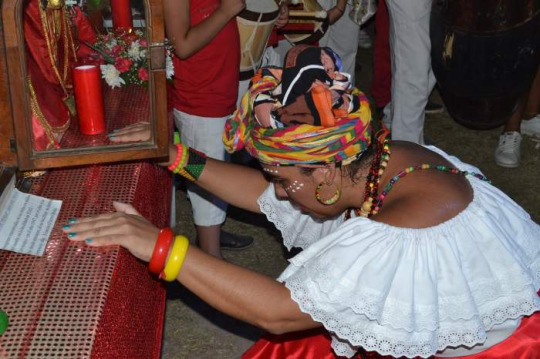


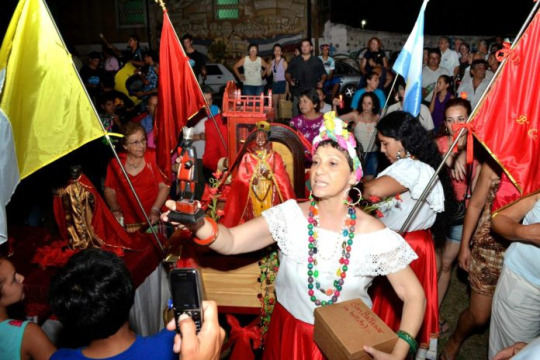
If you compare him to Xangó...
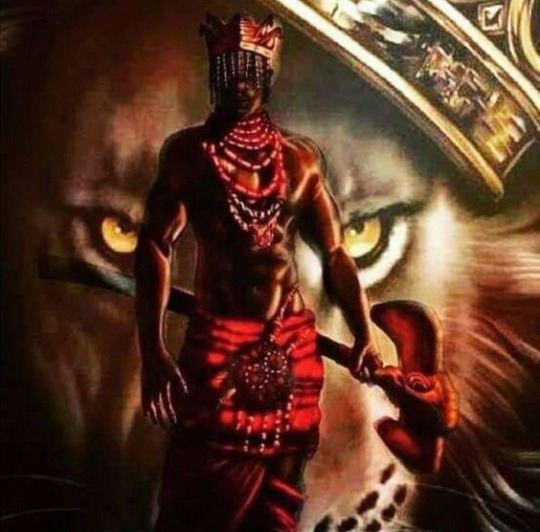
He carries a double-headed axe. He's often depicted wearing a crown. His colors are, surprisingly, also white and red, with gold accents. Also a King and a warrior, also associated with thunderstorms and fire, drums and dance. His followers also wear white and red beaded collares. Ringing any bells...?
Now, I am not saying they are the same Spirit, but there is an undeniable resemblance. You come to your own conclusions. It's kind of obvious that this afrodiasporic cult stems from either (a) a hidden, veiled cult to the orisha(s) or (b) a syncretic cult to african deities (not only orishas but maybe other african spirits too). There is, after all, strong ties not only to Yorubaland but also to Dahomey, Kongo, etc. Just in this instance, the spirit may resemble an orisha but the rhythms and dance are from kongo, so there is much more to it than just one or the other. There is a culture of resistance born from the union of Nations through music, faith and tradition.
Sources:
None of the images here belong to me: San Baltazar and festivities [1,2,3,4-6] and Xangó [1]
Festividad de San Baltasar : performances artístico-religiosas de la cofradía de la ciudad de Corrientes, by Cavalieri, Ana Belén, Universidad Nacional del Nordeste. Facultad de Artes, Diseño y Ciencias de la Cultura, 2018. Available for download at [Link]
San Baltazar, Historias de Corrientes at [Link]
The bamboula Lineage at [Link]
The Orishas, Indiana University at [Link]
#ATRs#afroargentina#afroargentines#afrolatine#afrolatinx#afrolatino#black saint#black saints#st balthazar#st. Balthazar#San Baltazar#Santería#shangó#xangó#santeria#african diaspora#african traditional religions#african diasporic religions#african diaspora religions#ADRs#san baltasar
20 notes
·
View notes
Note
cuales son las cuentas de ig que seguis?
calculo que te referís a cuentas de activismo afrolatinas? las que sigo son en su mayoría argentinas, acá están:
@/afrolatinas (está en portugués)
@/aintilatina (en inglés)
@/migrantasreconquista (en español)
@/argentinacolorized (en español)
@/femirulas (español)
@/espaciomemoria (no sé quién exactamente maneja la cuenta)
y estes son artistas y trabajadores afroargentines que no se enfocan solamente en activismo, pero creo que todes deberían apoyar su arte
@/lauraomegga
@/jenniferpaarker_
@/diganmeahi
@/tamybeltrame
@/luandafro
@/louisyupanqui
3 notes
·
View notes
Text
argentines cuando les preguntan si hay racismo en el país:
"No, bueno no como en Estados Unidos. Porque acá te dicen negrito de cariño. Ah, pero está lo de los pueblos originarios. Medio que los discriminan. Pero no sería racismo... Bueno, como en Estados Unidos. Un poco, pero no mucho"
Argentina es un país profundamente racista, aunque el tema del racismo no esté en la agenda publica como en otros países. Claro que no es idéntico a EE. UU., pues ninguna experiencia histórica es igual a la otra. Pero eso no quiere decir que el racismo no exista en el país o sea un tema de escalas (poco o mucho). El racismo es una violencia que sacude con fuerza a quien la padece y no es competencia de nadie decir si es "poco o mucho". No hay niveles tolerables de racismo. Argentina cuya identidad nacional se construye bajo la idea de que descendemos de los barcos, de la idea de "nación blanca", es racista. El imaginario que ronda esa idea invisibiliza a les afroargentines construyéndoles como extrajeres en su propia tierra. El relato histórico en orden de ese ideario cuenta que murieron en las guerras de independencia (extintos), así como posiciona a los pueblos originarios como por fuera de la comunidad (otres que habitan nuestras tierras). La identidad nacional argentina devenida de este ideario es profundamente racista porque borra de la historia e invisibiliza a las personas "no blancas".
A eso se suma que la otredad construida en función del color de piel siempre posición a la persona no blanca en situación de desventaja, de vulnerabilidad, de estigmatización y criminalidad. Acaso hace falta recordarle la identificación de la criminalidad con el color de piel en frases como "negro villero", por nombrar solo una? O recordar los recientes casos de violencia policial contra jóvenes por ser "morochos"? Los índices de violencia policial son mas altos cuando hablamos de personas racializadas.
Las personas racializadas, personas de identidad marrón (según su autodenominación) y afroargentines no cuentan con representación en los medios de comunicación, encuentran dificultades para hacer a ciertos trabajos y sufren violencia institucional. Todo como consecuencia de una matriz cultural racista donde, por ejemplo, el ideal de belleza es blanco (cis y heterosexual).
Argentina es un país multicultural que se piensa homogéneo a fuerza de excluir y invisibilizar, de poner al otre siempre como extranjere. Un ejemplo es la comunidad de ascendencia asiática, que a pesar de llevar generaciones en estas tierras siguen siendo percibides como recién llegades.
El racismo existe en la Argentina y antes de compartir opiniones de gente blanca en sus redes busquen las redes de les activistas afroargentines y de identidad marrón. Compartan sus testimonios, sus visiones y no la mirada sesgada de alguien que tiene el racisno internalizado y acusa ser progre desde su privilegio.
0 notes
Text
Luanda (cantautore afroargentine) hizo una playlist de trap afro
#la comparto por acá por si algune esta interesade!#la compartió en sus historias de instagram#su insta es @luandafro si no me equivoco
4 notes
·
View notes
Text
i'm doing a documentary with my uni classmates about a holocaust survivor who's the great-uncle of one of my classmates, and we're reconstructing his life story, how he survived, then lived for a few years in europe to finally come to argentina to raise a family. the man died of old age, along with his family and loved ones. he found a community here, and a country that loved him.
yes there were political policies that allowed nazis to flee to argentina after ww2. yes there were also policies that restricted jewish refugees from entering the country initially. but there were also afterwards extradition policies to get rid of the nazis and make them face trial!!! there is zero tolerance for that shit today. literally every single nazi text/imagery is illegal here. last year a girl from my university got expelled for designing a nazi vacuum cleaner (yes i'm not kidding.)
as a jewish woman i've faced antisemitism here, but to equal argentinians with nazis is erasure of jewish argentines, of afroargentines, of native argentines, of literally everyone who's not a white supremacist, and the tireless work they've done to get rid of nazi ideology within our culture. to see people from other countries -especially the usa- to make those jokes is beyond insulting, and fundamentally misguided. again, worry about your own nazis.
81 notes
·
View notes